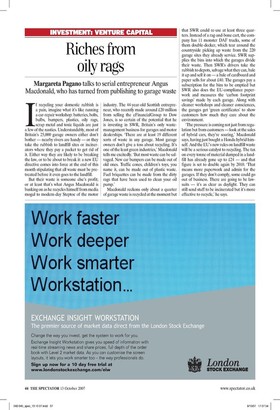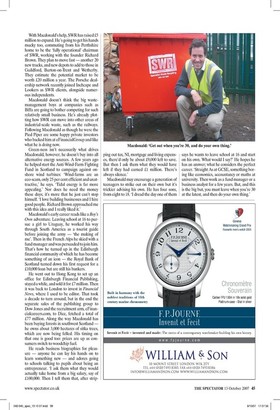Riches from oily rags
Margareta Pagano talks to serial entrepreneur Angus Macdonald, who has turned from publishing to garage waste 1 f recycling your domestic rubbish is a pain, imagine what it's like running a car-repair workshop: batteries, bolts, bulbs, bumpers, plastics, oily rags, scrap metal and toxic liquids are just a few of the nasties. Understandably, most of Britain's 25,000 garage owners either don't bother — nearby rivers are handy — or they take the rubbish to landfill sites or incinerators where they pay a packet to get rid of it. Either way they are likely to be breaking the law, or to be about to break it: a new EU directive comes into force at the end of this month stipulating that all waste must be pretreated before it even goes to the landfill.
But their waste is someone else's profit; or at least that's what Angus Macdonald is banking on as he recycles himself from media mogul to modern-day Steptoe of the motor industry. The 44-year-old Scottish entrepreneur, who recently made around £20 million from selling the eFinancialGroup to Dow Jones, is so certain of the potential that he is investing in SWR, Britain's only wastemanagement business for garages and motor dealerships. 'There are at least 19 different sorts of waste in any garage. Most garage owners don't give a toss about recycling. It's one of the least green industries,' Macdonald tells me excitedly. 'But most waste can be salvaged. New car bumpers can be made out of old ones. Traffic cones, children's toys, you name it, can be made out of plastic waste. Fuel briquettes can be made from the dirty rags that have been used to clean your oil pump.'
Macdonald reckons only about a quarter of garage waste is recycled at the moment but that SWR could re-use at least three quarters. Instead of a rag-and-bone cart, the company has 11 monster DAF trucks, some of them double-decker, which tear around the countryside picking up waste from the 220 garage sites they already service. SWR supplies the bins into which the garages divide their waste. Then SWR's drivers take the rubbish to depots, salvage what they can, bale it up and sell it on — a bale of cardboard and paper sells for about £40. The garages pay a subscription for the bins to be emptied but SWR also does the EU-compliance paperwork and measures the 'carbon footprint savings' made by each garage. Along with cleaner workshops and cleaner consciences, the garages get 'green certificates' to show customers how much they care about the environment.
'The pressure is coming not just from regulation but from customers — look at the sales of hybrid cars, they're soaring,' Macdonald says, having just bought a Honda hybrid himself. And the EU's new rules on landfill waste will be a serious catalyst to recycling. The tax on every tonne of material dumped in a landfill has already gone up to £24 — and that figure is set to double again by 2010. 'That means more paperwork and admin for the garages. If they don't comply, some could go out of business. There are going to be lawsuits — it's as clear as daylight. They can still send stuff to be incinerated but it's more effective to recycle,' he says.
With Macdonald's help, SWR has raised £5 million to expand. He's going to get his hands mucky too, commuting from his Perthshire home to be the 'fully operational' chairman of SWR, working with the founder Richard Brown. They plan to move fast — another 20 new trucks, and new depots to add to those in Guildford, Burton-on-Trent and Wetherby. They estimate the potential market to be worth £20 million a year. The Porsche dealership network recently joined Inchcape and Lookers as SWR clients, alongside numerous independents.
Macdonald doesn't think the big wastemanagement boys at companies such as Biffa are going to bother competing for such relatively small business. He's already plotting how SWR can move into other areas of industrial-scale waste, such as the railways. Following Macdonald as though he were the Pied Piper are some happy private investors who backed him at eFinancialGroup and like what he is doing now.
Green-ness isn't necessarily what drives Macdonald, however; he doesn't buy into all alternative energy sources. A few years ago he helped start the Anti-Wind-Farm Fighting Fund in Scotland to campaign against onshore wind turbines: Wind-farms are an eco-scam, only 25 per cent efficient and unattractive,' he says. 'Tidal energy is far more appealing.' Nor does he need the money these days; it's more that he just can't stop himself. 'I love building businesses and I hire good people. Richard Brown approached me with this idea and I really liked it.'
Macdonald's early career reads like a Boy's Own adventure. Leaving school at 16 to pursue a girl to Uruguay, he worked his way through South America as a tourist guide before joining the army — `the making of me'. Then in the French Alps he skied with a fund manager and was persuaded to join him That's how he turned up in the Edinburgh financial community of which he has become something of an icon — the Royal Bank of Scotland turned down his first request for a £10,000 loan but are still his bankers.
He went out to Hong Kong to set up an office for Edinburgh Financial Publishing, stayed awhile, and sold it for £7 million Then it was back to London to invest in Financial News, where I used to be editor. That took a decade to turn around, but in the end the separate sales of the publishing group to Dow Jones and the recruitment arm, eFinancialcareers.com, to Dice, fetched a total of £77 million Along the way Macdonald has been buying forests in southwest Scotland — he owns about 3,000 hectares of sitka trees, which are now being felled. His timing on that one is good too: prices are up as consumers switch to woodchip fuel.
He reads business biographies for pleasure — anyone he can lay his hands on to learn something new — and adores going to schools talking to pupils about being an entrepreneur. 'I ask them what they would actually take home from a big salary, say of £100,000. Then I tell them that, after stripping out tax, NI, mortgage and living expenses, there'd only be about £9,000 left to save. But then I ask them what they would have left if they had earned £1 million There's always silence.'
Macdonald may encourage a generation of teenagers to strike out on their own but it's trickier advising his own. He has four sons, from eight to 18. 'I dread the day one of them says he wants to leave school at 16 and start on his own. What would I say?' He hopes he has an answer; what he considers the perfect career. 'Straight As at GCSE, something boring like economics, accountancy or maths at university. Then work as a fund manager or a business analyst for a few years. But, and this is the big but, you must leave when you're 30 at the latest, and then do your own thing.'




































































 Previous page
Previous page